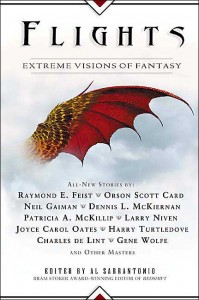 Following up on his previous anthology, Redshift, which was a collection of science fiction stories that sought to redefine the boundaries of expectations, Al Sarrantonio has now come out with the companion volume, which looks towards raising the bar for fantasy in terms of quality and imagination. Flights is a massive volume as far as anthologies go: 560 pages and over 200,000 words, broken down 29 stories of varying lengths, ranging from short-short to novella.
Following up on his previous anthology, Redshift, which was a collection of science fiction stories that sought to redefine the boundaries of expectations, Al Sarrantonio has now come out with the companion volume, which looks towards raising the bar for fantasy in terms of quality and imagination. Flights is a massive volume as far as anthologies go: 560 pages and over 200,000 words, broken down 29 stories of varying lengths, ranging from short-short to novella.
The authors represented within are some of the very best in the field, including Charles de Lint, Larry Niven, Nina Kiriki Hoffman, Robert Silverberg, Neil Gaiman, Harry Turtledove, Orson Scott Card, Jeffrey Ford and Gene Wolfe. With everything from high fantasy to urban fantasy to fantasy that defies casual categorization, this is easily one of the more impressive collections to hit the shelves this year thus far. There’s no way I can discuss every single story, not without running way over my limit, so let me present a few, taken from the book like snapshots.
Joe Lansdale’s “Bill, the Little Steam Shovel,” is presented as one might a children’s book. Certainly on the surface, the adventures of a steam shovel who just wants to do the very best he can would seem like a children’s story, but in this word, steam shovels aren’t all innocent and pure and sparkling. They have needs and desires and use foul language when no one’s looking, like the rest of us. While I’d love to see this one properly illustrated, I’d be afraid to leave it lying around for the kids. For adults, it’s great fun, however.
L.E. Modesitt’s “Fallen Angel” is an unusual, somewhat sad look at a different side to the relationship between Heaven and Hell, and between the angels who stayed, and the one who fell the furthest. It’s a fascinating premise, but may require more than one reading to fully get all the subtleties.
Dennis L McKiernan retells an old and familiar fairy tale in “A Tower With No Doors.” There’s a prince, a witch, and a lovely maiden trapped in a high tower. But not everything is as it seems.
In “Riding Shotgun” by Charles de Lint, a man with a troubled past gets a chance to change it, only to discover that the price he pays is more than just his life. Has his atonement, however, unleashed something even worse? Part ghost story, part urban legend, part time travel, it’s a complex cycle of events which lead into unexpected territory, but with hope always at the end of the tunnel. Though de Lint’s tackled some of these themes before, he still manages to make them feel fresh and new, and his solution is inventive without wrapping things up too neatly.
Kit Reed delivers a story about the day after the end of the world, in “Perpetua.” A family of miniaturized survivors travel in a specially outfitted alligator, avoiding the disasters which have made the outside world all but uninhabitable. But for one girl, survival is nothing without the man she loves, and the bond she forges with the alligator could save or doom them all. Plain and simple, I love the concept, and the imagery the story conjures up.
Peter Schneider gives us “Tots,” which does for four-year-olds what cockfighting did for chickens. Yes, two toddlers enter, one toddler leaves. I don’t know whether to be fascinated, appalled, or both. But then again, that’s part of the magic of the genre: anything is possible with the right twist of imagination.
Neil Gaiman’s “The Problem With Susan” can be looked at as an unofficial epilogue to the Narnia books. After all, whatever did happen to Susan, the only one of the four children not to show up for The Last Battle? What if she carried on and grew up? But that’s not the whole story. This is a dreamlike story, casting the characters in a strange new light, placing subversive, thoughtful suggestions regarding the Lion and the Witch (but no wardrobe), as well as the nature of Mary Poppins and of childrens’ books. It’s a typically Gaimanesque piece, taking the familiar and twisting it around so that we’re forced to reconsider what we’ve always known, making us reevaluate and reappreciate it.
The above stories are just the tip of the iceberg. What can I say, except that if you love fantasy in any of its forms, and you enjoy short fiction, Flights may very well be the don’t-miss collection of the year, sure to produce some award nominees and award winners, and maybe a few new classics. Miss this, and you’ll be losing out on something rich and strange.
